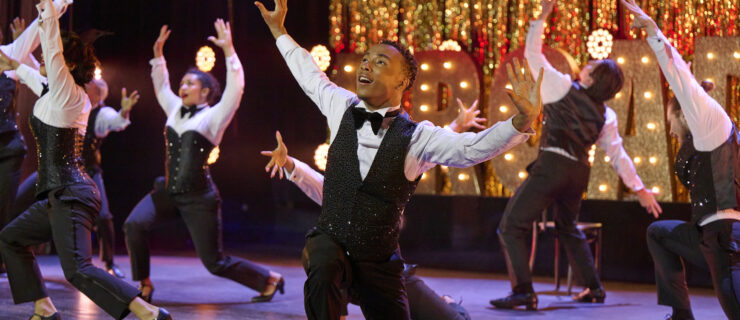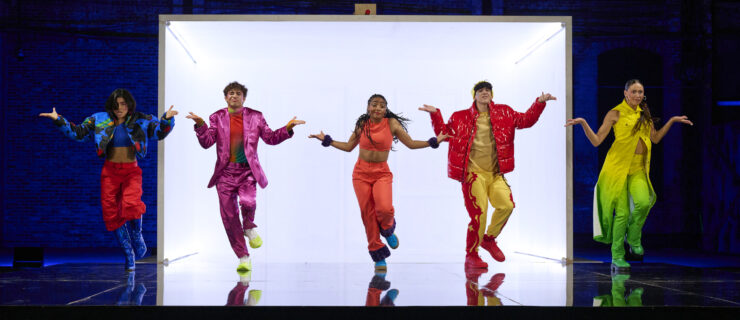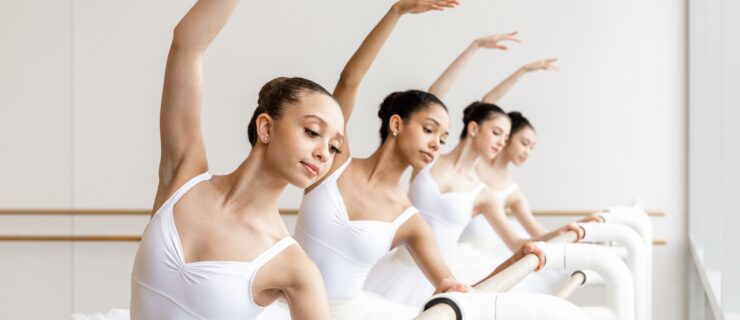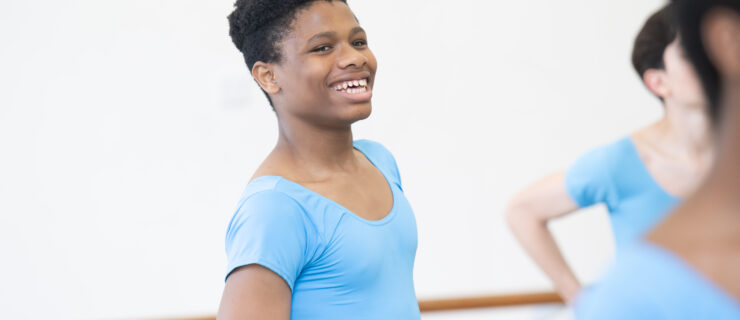Go Big or Go Home: Lee Howard
Watching the vibrant Chicago tap company M.A.D.D. Rhythms rehearse, you can’t miss Lee Howard. As tall as he is thin, each wing he throws out sends his arms in a monstrous wingspan around his exceedingly lanky frame. His movements are often understated and always precise, as he slides nimbly from toe to heel and heel to toe, whips into dizzying turns and pounds out oh-so-intricate rhythms.
Within the tap community, Lee’s balance of old-school artistry and contemporary appeal has gained him notice. “He’s got the voracity of a Savion Glover, but when he’s dancing, he conveys that warmth that, say, the Nicholas Brothers conveyed,” says Bril Barrett, Lee’s longtime teacher and M.A.D.D. Rhythms director. At just 19 years old, this college freshman is dedicated to honing his tapping skills—and to diversifying his talents to make an impact on the world.
Taking on Tap
Growing up in Chicago’s South Side Morgan Park neighborhood, Lee inherited the dance bug in his maternal genes: Both his grandmother and mother were dancers, and his mom even shared the stage with legendary entertainer Sammy Davis, Jr. in his heyday.
At the age of 9, Lee began showing interest in his younger sister’s dance performances (with South Side dance institution the Sammy Dyer School of Dancing), so his mom signed him up for acrobatics and tap classes with Barrett and renowned teacher Idella Reed Davis.
As Lee started to take more tap classes, Barrett quickly pegged him as a trouble kid, who would tune out because he was the only boy in a class of girls. “He would always end up facing the wrong direction, or be in the corner just doing his own thing,” says Barrett. “I noticed how quickly he picked up choreography, but he was never paying attention.” It was when Lee started attending jam sessions that Barrett discovered the true problem—and it wasn’t a lack of interest; Lee wasn’t being challenged, which had left him bored. “We would take an hour and circle up and improv together,” says Barrett. “And that’s where he started to really shine…because it made him challenge himself.” Lee remembers these first experiences of tap improv as an eye-opener toward the possibilities of the artform. “It was just way new to me,” he says. “And it blew my mind.”
Coming Into His Own
When Lee was 12 in the summer of 2001, Barrett invited him to join M.A.D.D. Rhythms, a group of young tappers whom he trained and booked occasional performances for around the city. It was then, in his early to mid-teens, that Lee made the biggest strides in his development as a dancer.
“I wasn’t trained in music really, and my phrasing was off. I had bad timing and everything,” he says. “There were a lot of factors that I still had to work on, and during that time in my life, that’s what Bril was drilling me to do.” Studying with M.A.D.D. Rhythms and attending tap festivals like the St. Louis Tap Festival, Chicago Human Rhythm Project and the L.A. Tap Fest helped Lee build his technique, musicality, knowledge of history and character. “I was privileged to have a class with Fayard Nicholas before he passed,” Lee says, adding that other tap masters he’s been honored to meet include Harold Cromer, Skip Cunningham and Arthur Duncan.
Barrett has watched Lee come into his own in recent years, and as he’s earned festival scholarships and awards such as first place in Chicago Human Rhythm Project’s Tap OFF, it’s clear that others have noticed his talent, too. “Rhythmically, the things that he does are on a whole different level,” says Barrett. “Last year, Dianne Walker compared him to jazz musicians Miles Davis and Thelonious Monk. He goes inside of the rhythms, and how he hears them is like none other. When Dr. Leonard Reed and Ernest ‘Brownie’ Brown have seen him dance, they’ve all said, ‘He’s doing stuff with his feet we were never doing.’” It’s clear, too, that Lee has taken this encouragement from respected tap masters with the utmost reverence. “To hear their opinion that I’m dancing well is an achievement in itself,” he says.
Moving Forward
As its members have grown into adulthood, M.A.D.D. Rhythms has become a multi-faceted organization, with a professional-caliber performing company, a tap academy staffed by company members and a youth company to train tap’s next generation. This past year has been a landmark one for Lee because Barrett asked him to teach his first tap academy class and choreograph his first piece—set to the old-school jazz number “Take Five”—on the company. “I like to try new things with choreography,” says Lee. “I want it to be different from what everyone else is doing, so I may do a shuffle or a pull back in a weird way and at a unique time on purpose, just to create a different image and paint a new picture.”
This past spring, Lee graduated from Chi-town’s prestigious Whitney M. Young Magnet High School with a 3.9 GPA, and balanced his schedule training and performing with M.A.D.D. Rhythms with membership in his school’s African American Culture Club and Future Business Leaders of America. Now, he’s rounding out his first semester as a freshman at Columbia College Chicago, studying performing arts management. “You have to know the business side,” Lee says of his choice of major, in which he’ll study everything from grant writing to comparative cultural policy. “If you don’t, you’ll get cheated and swindled and you won’t know what’s going on—even if it’s happening right under your nose.” For Lee, going to college in an area where he can continue tapping was a top priority. He’ll continue to perform and teach with M.A.D.D. Rhythms as he earns his degree.
“I’ve always been an artsy person,” says Lee. His creative sensibilities have led him to cultivate other skills that complement his number-one love, tap. It’s rare to find him without his sketchbook, crammed with colorful drawings, or his laptop, on which he mashes up tunes with tap rhythms and designs business cards for fellow tap dancers and graphics for tap events, like M.A.D.D. Rhythms’ third annual Chicago Tap Summit in October. His love for music—he’s dabbled in playing violin, saxophone, piano, drums and guitar over the years—has not only developed his ear for musicality as a dancer, but has also connected him with some musician classmates, with whom he already has plans to produce a tap and music show following graduation.
Looking ahead, Lee’s biggest dreams are ones that will promote and advance tap as an artform: He wants to hone his acting abilities to bring more tap into movies and TV, and amp up his vocal and instrumental skills to bring tap into the music industry. “A lot of people don’t understand tap dance because they don’t listen,” Lee says. “I think getting tap into the music industry would help, because then you’d actually listen to how tap is music.”
Packing enough ambition to last him far past graduation, we’ve got no doubts that this devoted dude will live up to his dreams. And above all, no matter which paths he treads, Lee says, “I want to be known as a tap dancer first.”



